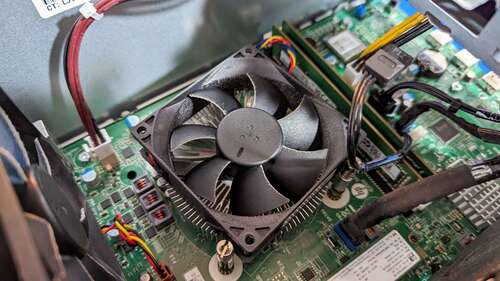
In the past, computers made all sorts of mechanical and electronic noises as a normal part of how they worked, but there are some noises a modern computer should never make. If you hear any one of these, pay attention!
1 Whine: Sometimes Benign, Sometimes Not
A high-pitched whine can be the equivalent of your computer saying, “I’m stressed out!” Usually, this is a symptom of coil whine, which happens when electrical components vibrate under load. Most often, it’s benign, but it can indicate poor-quality components that may give out sooner than expected.
If you hear coil whine only under high stress (e.g. video rendering), it’s probably nothing to worry about, and if you hear it while gaming you probably need to turn on V-sync or another form of frame rate limiter to prevent your computer from rendering too many frames. However, if you hear persistent coil whine from a component, it’s probably worth exchanging it under warranty or having it checked out by a professional.
2 Buzzing Fans: They’re On the Way Out
The soothing white noise of computer fans is usually a good sign. It means your system is keeping its cool. However, when that soothing noise becomes a buzzing drone, you’ve got a problem. This is often due to dust buildup on the fan blades or worn-out bearings, making them less effective and more audible.
Get yourself a can of compressed air and give your fans a good cleaning and if that doesn’t work, they’re usually not that expensive to replace. If the fans on your GPU or CPU cooler are making sickly mechanical noises, it can be a little more tedious to repair or replace them. But if they stop working at all, you’ll wish you’d taken care of the problem sooner!
3 Ticking Fans: They’re Smacking Something Besides Air
If your fan is ticking like a metronome, it’s not getting ready to drop a sick beat—it could indicate that the fan blades are hitting something, like a wire. If not fixed, your fan could eventually fail, leaving your components without adequate cooling.
In some instances, a fan may end up slicing open a wire, which could cause a short circuit or even a fire. Open up your machine and make sure there are no obstructions.
If you have a computer with no mechanical hard drives and only solid-state drives, won’t be clicking from the drives because there are no moving parts. If you hear clicking, it’s likely an issue with the fans.
But if you have a mechanical hard drive, and you hear it, you should be concerned. A clicking sound coming from your hard drive is like the death knell of a sinking ship. It’s a clear indicator that your HDD is failing. Make sure to back up your data immediately and replace the hard drive immediately.
It’s just a matter of time before the entire thing gives out, taking your data with it.
5 Creaks, Snaps, and Pops (Especially in Laptops)
If you hear these sounds, particularly in a laptop, they could be due to thermal expansion and contraction of internal parts. The occasional groan or creak is one thing, especially if your computer or monitor is heating up in a cold room (or, vice versa, cooling off at the end of a gaming session or such).
While some level of these noises is normal, any significant change should cause concern. It might be due to structural damage or weakening components, especially if the protesting computer is a laptop.
Loud pops, creaks, or snapping noises, when you operate the screen hinge, is a big warning sign, and this is a common point of laptop failure. If your hinge starts making a racket, do your best to minimize the number of times you open and close the lid. It’s best to let a pro check the machine out.
6 Whistle or Sizzling Sound: Something’s Cooking
Whistles and sizzles are particularly dangerous. A faint coil whine is one thing, but if your computer starts making a distinct high-pitched whistle sound like there is a tiny kettle hidden away inside somewhere it’s time for immediate action. The same goes for any sort of sizzling sound.
If your laptop battery or your desktop’s power supply starts making these noises, switch off the device and disconnect it from the electrical outlet immediately. These sounds often indicate an electrical issue that could result in a fire. Contact the manufacturer or a professional service center for an immediate inspection. When in doubt, get the laptop out of your office or residence and place it in a fireproof container.
Our computers usually tell us when they’re not feeling well. These noises are your first warning that it’s time to look under the hood before a minor issue becomes a major meltdown. A little proactive care can go a long way in avoiding system failures and potential data loss. So the next time your computer starts to make its own music, don’t just tune it out. It might be trying to tell you something important.

